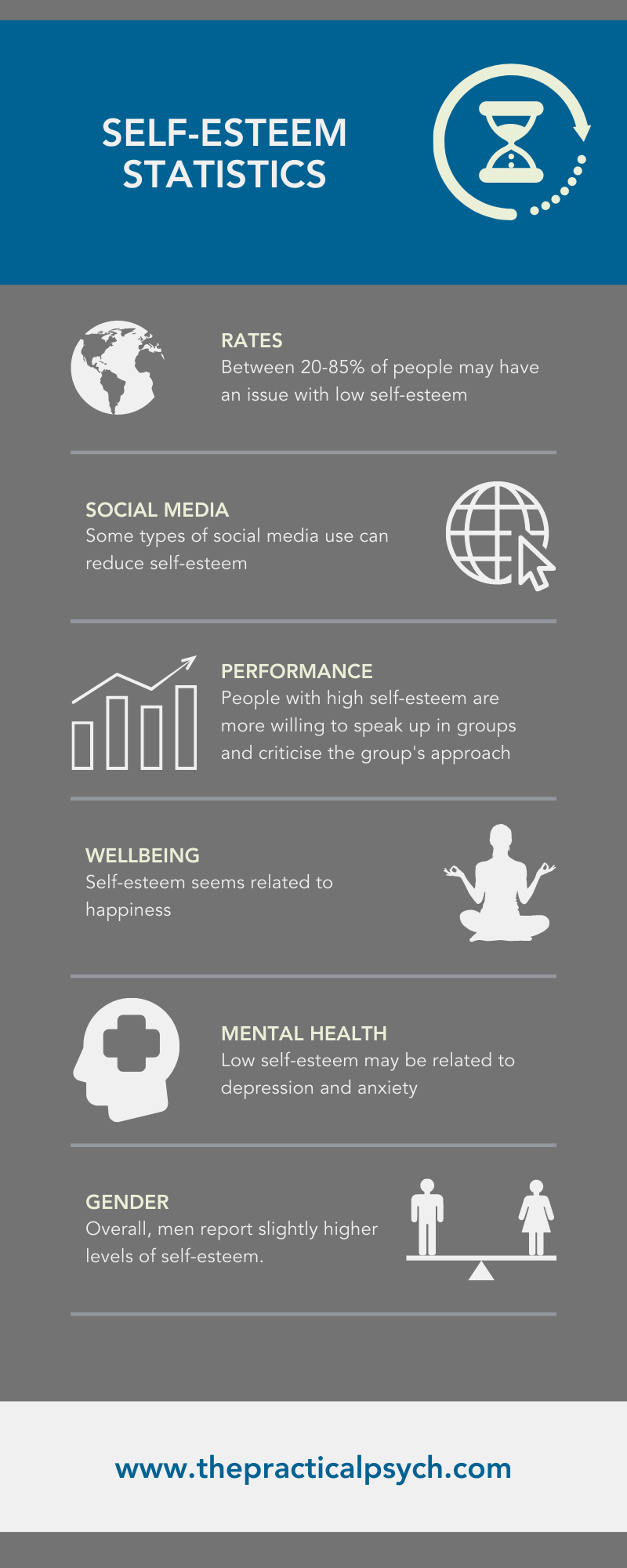What Can You Do About Low Self-Esteem?
The Low-Down On Low Self-Esteem
Clients often ask me about self-esteem, particularly 'How can I improve my self-esteem?' This concept is wildly popular in psychology and western society. But is it all it's cracked up to be?
In this article, I discuss the following topics:
Self-esteem definition
The Oxford dictionary defines self-esteem as the attitudes or opinions towards oneself. The evaluations we make about ourselves across can be positive or negative and can apply across various dimensions (1). These attributes range from how we look to specific personality characteristics.
Researchers have been busy researching self-worth for many years. Key lines of investigation have been figuring out what determines self-esteem levels, and how it relates to psychologically interesting things like mood, happiness, and antisocial behaviour.
Self-esteem synonym
There are several similar and related concepts in this topic area. These include self-worth, self-concept, self-perception, self-regard, and self-estimation. These terms are related with varying degrees of overlap.
The distinction between self-esteem and self-concept is an important one. Self-concept is how you describe yourself in terms of skills, behaviours, personality traits, interests etc (e.g., I am a guitar player, I like my own company). By contrast, self-esteem is the evaluation of these elements (e.g., I am Jimi Hendrix reincarnated, I am an introverted loser).
Six pillars of self-esteem
‘Models’ of self-esteem are attempts to explain how this concept works in the real world. For example, Melainie Fennell’s model assumes that difficult early life experiences establish a mental picture of ourselves along with ‘rules for living’ (e.g., People will reject me if I don’t perform perfectly). A negative cycle of unhelpful thoughts, feelings and behaviour is triggered whenever we fail to meet expected standards.
Another account of self-esteem comes from Nathaniel Branden in his book The six pillars of self-esteem. This is not so much a model, but an argument for six factors thought to raise or lower self-esteem. These pillars are: living consciously, self-acceptance, self-responsibility, self-assertiveness, living purposefully, and personal integrity.
Low self-esteem
Low esteem is holding negative beliefs and opinions towards yourself (e.g., regarding self as unattractive, feeling like you don’t matter).
This problem shows itself in different ways. People may have low confidence in their opinions, have a poor sense of self-worth, think they are unworthy of love and affection, experience negative thoughts, and experience poor mental health.
People also respond to this problem with strategies that create additional problems. Examples include setting unrealistically high standards and not delegating tasks to others.
Self-esteem activities
Many people are interested in how to boost self-esteem, believing this will enhance self-confidence and self-worth. But despite the popularity of self-worth, we shouldn't over-emphasise the importance it plays in our lives.
There are many examples of this inflation (see this Guardian article for a shocking example).
There are many other reasons to be cautious about self-esteem, but I want to mention just a couple of limitations in this article.
Self-worth
Low esteem can appear in different forms.
Thinking patterns about ourselves can have a strong negative bias. We might recall memories of perceived failures more readily than successes. Behaviour effects range from avoiding social or challenging situations to writing off our achievements in conversations. People can even experience additional psychological problems, such as depression and social anxiety.
Poor self-opinion can bring unfavourable comparisons to other people. However, this runs the risk that you will ‘overestimate the competition’. No one is perfect, but there is a tendency to view others through rose-tinted glasses when we don’t respect ourselves. If the rest of the world seems better than you, remember that we are all surrounded by people battling fears, self-doubt and anxiety. You don’t have to be bullied into silence by poor self-image.
Flimsy research
Self-esteem is not a terrible concept, but we should understand its limitations. There are several problems with the body of self-worth research.
For starters, there isn't clear agreement on how to define self-esteem, let alone the best way to measure it. When examining the link between self-esteem and important concepts (e.g., well-being), many studies have failed to account for variables that might influence these relationships. For example, associating self-worth with workplace performance is of little value if we don't account for variables like job skills, support from management, resource availability (e.g., support staff), and difficult colleagues (e.g., read about narcissism in this article).
One implication of these research limitations is reduced confidence in conclusions made across studies. What's more, we can overestimate the significance of self-esteem in our lives. While higher self-worth does appear to be associated with increased levels of happiness and lower levels of depression, one influential review concluded that self-esteem really doesn't predict much else (2)!
The dark side?
People typically worry about low/no self-esteem. But high self-esteem is not necessarily a good thing. Notwithstanding the limits of research studies, enhanced self-esteem has been associated with aggression (3) and narcissism (4)……cue that classic line from Parks and Recreation “I have done nothing wrong ever in my life”.
Self-esteem vs confidence
Another shell in this omelette is that self-worth is fragile and can be easily damaged or influenced by outside forces. Self-esteem requires that we think of ourselves as a bunch of 'things' (e.g., I am intelligent, I am shy). In other words, we think of ourselves as a collection of 'contents', like furniture in a house. Another term for this way of thinking is the 'conceptualised self' (5).
Self-esteem is unstable
But what happens when we fail at something, or a person passes a critical comment about us?
I am good at my job can become I am incompetent
I am intelligent turns to I am an idiot
Can one adverse event literally erase skills or instantly reduce our IQ by 20 points? Or, could it be that self-esteem is unstable and prone to rapid fluctuations based on events in our daily lives?
You can invest massive effort into boosting your self-worth, only to see this work erased by one challenging event that you had no control over.
Even though self-esteem is unstable, we can become unreasonably invested in consistently being a particular type of person (e.g., I am very patient, I must never fail). In reality, our thoughts, feelings, and behaviours change across situations. People who regard themselves as shy can recall moments where they were the life of the party. People considered generous can act selfishly.
For some people, negative inner experiences (e.g., negative thoughts and feelings) threaten a positive self-image. Repression might be a coping strategy to cope in this scenario.
Self-esteem test
Tests for self-esteem are popular. But, given some of the issues with this concept, take care in analysing self-esteem test/questionnaire results.
Self-worth and the conceptualised self
Several psychologists have suggested that, instead of investing in self-esteem or building a conceptualised self, we can simply observe thoughts and inner experiences.
Self worth and self compassion
Instead of being the furniture in a house (conceptualised self), we can be the house itself- a 'container' or context from which we observe thoughts and feelings. We can move furniture around, get rid of some pieces, or buy a new bed. In the same way, our inner psychological experiences can change.
This 'observer self' approach has potential advantages (6).
It can reduce an over-investment in self-worth or an identity represented by a stable bunch of thoughts, feelings, and behaviours.
There is no 'right' or 'wrong' person with the observer self.
This perspective allows for more flexibility and can help us reflect on our inner experiences with curiosity rather than harsh judgement.
The observer self is an important concept in Acceptance and Commitment Therapy (ACT).
Getting a feel for the observer self approach can take some work. So don't sweat it if you struggle to get it. Metaphors like house vs furniture and chessboard vs chess pieces can help.
Specific exercises are also available here.
But, some people tell me that realising the shortcomings of self-esteem in itself is helpful.
I hope this perspective on self-worth helps you too.
Self-compassion
In addition to the self as concept idea is self-compassion. The latter is another alternative to self-worth. One of the leading voices in self-compassion is Kirsten Neff.
Here is her compassion article.
Positive affirmations for self-esteem
I am often asked about the value of affirmations. Do they work? The answer is not yet clear.
Self-affirmations may have positive effects on attitudes (7). Affirmations may also be linked with measurable changes in brain activity (8). But we have much to learn in this area. My experience tells me that affirmations are of no use if you don’t believe them. These statements should lead to complementary actions. For example, the statement ‘I am worthy of respect’ should be followed by calling out disrespectful behaviour (e.g., ‘I did not like the way you are speaking to me’).
Self-esteem quotes
No boundary or barrier surrounds the heart of a person that loves their self and others. Shannon Alder
Don't be a victim of your thoughts. Darlene Lancer
Every sane adult is insecure about at least one thing on or about them. Mokokoma Mokhonoana
The future belongs to those who believe in the beauty of their dreams. Eleanor Roosevelt
Make the most of yourself, for that is all there is of you. Ralph Waldo Emerson
You really have to love yourself to get anything done in this world. Lucille Ball
Until you value yourself, you won't value your time. Until you value your time, you will not do anything with it. Scott Peck
When I say it’s you I like, I’m talking about that part of you that knows that life is far more than anything you can ever see or hear or touch. Fred Rogers
If you make friends with yourself you will never be alone. Maxwell Maltz
There are times when I don't take roles because I don't want to be perceived a certain way. Harvey Fierstein
Why should we worry about what others think of us, do we have more confidence in their opinions than we do our own? Brigham Young
Self-esteem lyrics
There are many songs on the subject of self-esteem. We see the experience of low self-worth from many angles. Songwriters sometimes write from personal experience. Listening to this music can help people less alone and hear about an experience that can be hard to put into words. There are also some great examples of self-respect and building self-worth. A few examples of these songs are:
Self Esteem- The Offspring
Hold On- Alabama Shakes
Pushover- Etta James
Summary
Many people come to me for help with low self-esteem. It is important to know that you can do something about this problem. There are good resources available. I have provided links to some of these materials above. Another reliable book on addressing low self-esteem is by Melaine Fennell.
We are Coaching & Clinical Psychologists with extensive experience helping people conquer a range of wellbeing and performance issues at home and in the workplace. We can also help with low self-esteem. Read more about our work, watch practical skills videos or browse other articles. Get in touch anytime.
References
(1) Hewitt, J. P. (2002). The social construction of self-esteem. In C. R. Snyder and S. J Lopez (Eds.), Handbook of positive psychology (pp. 135-147). Oxford: Oxford University Press.
(2) Baumeister, R. F., Campbell, J. D., Krueger, J. I., & Vohs, K. D. (2003). Does high self-esteem cause better performance, interpersonal success, happiness, or healthier lifestyles? Psychological Science in the Public Interest, 4, 1–44.
(3) Baumeister, R. F., Smark, L., & Boden, J. M. (1996). Relation of threatened egotism to violence and aggression: The dark side of high self-esteem. Psychological Review, 103(1), 5-33.
(4) Cichocka et al. (2019). Does high self-esteem foster narcissism? Testing the bidirectional relationships between self-esteem, narcissistic admiration and rivalry. Journal of Research in Personality, 83
(5) Luoma, J. B., Hayes, S. C., & Walser, R. D. (2007). Learning ACT: An acceptance & commitment therapy skills-training manual for therapists. Oakland, CA: New Harbinger.
(6) Harris, R. (2009). Act made simple. Oakland: New Harbinger.
(7) Amy MCQueen & William M. P. Klein (2006) Experimental manipulations of self-affirmation: A systematic review, Self and Identity, 5:4, 289-354, DOI: 10.1080/15298860600805325
(8) Cascio, C. N., O'Donnell, M. B., Tinney, F. J., Lieberman, M. D., Taylor, S. E., Strecher, V. J., & Falk, E. B. (2016). Self-affirmation activates brain systems associated with self-related processing and reward and is reinforced by future orientation. Social cognitive and affective neuroscience, 11(4), 621–629. https://doi.org/10.1093/scan/nsv136
Infographic references
Baumeister, R. F. et al. (2003). Does high self-esteem cause better performance, interpersonal success, happiness, or healthier lifestyles? Psychological Science in the Public Interest, 4(1), 1-44.
Kling, K. C., Hyde, J. S., Showers, C. J., & Buswell, B. N. (1999). Gender differences in self-esteem: A meta-analysis. Psychological Bulletin, 125(4), 470–500.
Nguyen, D. T. et al. (2019). Low self-esteem and its association with anxiety, depression, and suicidal ideation in Vietnamese secondary school students: A cross-sectional study. Frontiers in Psychiatry, 10, 698
Rubino, J. (2006). The self-esteem book. Vision Works Publishing.



